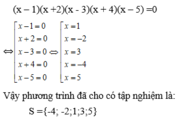Giải phương trình: x 3 - 4 x 2 + 5 x - 2 = 0

Những câu hỏi liên quan
Bài 1: Giải phương trình và bất phương trình sau: 1. 5.(2-3x). (x-2) = 3.( 1-3x) 2. 4x^2 + 4x + 1= 0 3. 4x^2 - 9= 0 4. 5x^2 - 10=0 5. x^2 - 3x= -2 6. |x-5| - 3= 0
1) Giải các phương trình sau : a) x-3/x=2-x-3/x+3 b) 3x^2-2x-16=0 2) Giải bất phương trình sau: 4x-3/4>3x-5/3-2x-7/12
\(a,\dfrac{x-3}{x}=\dfrac{x-3}{x+3}\)\(\left(đk:x\ne0,-3\right)\)
\(\Leftrightarrow\dfrac{x-3}{x}-\dfrac{x-3}{x+3}=0\)
\(\Leftrightarrow\dfrac{\left(x-3\right)\left(x+3\right)-x\left(x-3\right)}{x\left(x+3\right)}=0\)
\(\Leftrightarrow x^2-9-x^2+3x=0\)
\(\Leftrightarrow3x-9=0\)
\(\Leftrightarrow3x=9\)
\(\Leftrightarrow x=3\left(n\right)\)
Vậy \(S=\left\{3\right\}\)
Đúng 1
Bình luận (0)
\(b,\dfrac{4x-3}{4}>\dfrac{3x-5}{3}-\dfrac{2x-7}{12}\)
\(\Leftrightarrow\dfrac{4x-3}{4}-\dfrac{3x-5}{3}+\dfrac{2x-7}{12}>0\)
\(\Leftrightarrow\dfrac{3\left(4x-3\right)-4\left(3x-5\right)+2x-7}{12}>0\)
\(\Leftrightarrow12x-9-12x+20+2x-7>0\)
\(\Leftrightarrow2x+4>0\)
\(\Leftrightarrow2x>-4\)
\(\Leftrightarrow x>-2\)
Đúng 1
Bình luận (0)
bài 1 giải các phương trình sau:h,left(dfrac{3}{4}x-1right)left(dfrac{5}{3}x+2right)0bài 2 giải các phương trình sau:b,3x-152x(x-5) m,(1-x)(5x+3)(3x-7)(x-1)d,x(x+6)-7x-420 p,left(2x-1right)^2-40f,x^3+2x^2-left(x-2right)0 r,left(2x-1right)^249h,(3x-1)(6x+1)(x+7)(3x-1) t,left(5x-3right)^2-left(4x-7right)^20j,left(2x-5right)^2-left(x+2right)^20 u,x^2-10x+160w,x...
Đọc tiếp
bài 1 giải các phương trình sau:
h,\(\left(\dfrac{3}{4}x-1\right)\left(\dfrac{5}{3}x+2\right)=0\)
bài 2 giải các phương trình sau:
b,3x-15=2x(x-5) m,(1-x)(5x+3)=(3x-7)(x-1)
d,x(x+6)-7x-42=0 p,\(\left(2x-1\right)^2-4=0\)
f,\(x^3+2x^2-\left(x-2\right)=0\) r,\(\left(2x-1\right)^2=49\)
h,(3x-1)(6x+1)=(x+7)(3x-1) t,\(\left(5x-3\right)^2-\left(4x-7\right)^2=0\)
j,\(\left(2x-5\right)^2-\left(x+2\right)^2=0\) u,\(x^2-10x+16=0\)
w,\(x^2-x-12=0\)
Bài `1:`
`h)(3/4x-1)(5/3x+2)=0`
`=>[(3/4x-1=0),(5/3x+2=0):}=>[(x=4/3),(x=-6/5):}`
______________
Bài `2:`
`b)3x-15=2x(x-5)`
`<=>3(x-5)-2x(x-5)=0`
`<=>(x-5)(3-2x)=0<=>[(x=5),(x=3/2):}`
`d)x(x+6)-7x-42=0`
`<=>x(x+6)-7(x+6)=0`
`<=>(x+6)(x-7)=0<=>[(x=-6),(x=7):}`
`f)x^3-2x^2-(x-2)=0`
`<=>x^2(x-2)-(x-2)=0`
`<=>(x-2)(x^2-1)=0<=>[(x=2),(x^2=1<=>x=+-2):}`
`h)(3x-1)(6x+1)=(x+7)(3x-1)`
`<=>18x^2+3x-6x-1=3x^2-x+21x-7`
`<=>15x^2-23x+6=0<=>15x^2-5x-18x+6=0`
`<=>(3x-1)(5x-1)=0<=>[(x=1/3),(x=1/5):}`
`j)(2x-5)^2-(x+2)^2=0`
`<=>(2x-5-x-2)(2x-5+x+2)=0`
`<=>(x-7)(3x-3)=0<=>[(x=7),(x=1):}`
`w)x^2-x-12=0`
`<=>x^2-4x+3x-12=0`
`<=>(x-4)(x+3)=0<=>[(x=4),(x=-3):}`
Đúng 1
Bình luận (0)
`m)(1-x)(5x+3)=(3x-7)(x-1)`
`<=>(1-x)(5x+3)+(1-x)(3x-7)=0`
`<=>(1-x)(5x+3+3x-7)=0`
`<=>(1-x)(8x-4)=0<=>[(x=1),(x=1/2):}`
`p)(2x-1)^2-4=0`
`<=>(2x-1-2)(2x-1+2)=0`
`<=>(2x-3)(2x+1)=0<=>[(x=3/2),(x=-1/2):}`
`r)(2x-1)^2=49`
`<=>(2x-1-7)(2x-1+7)=0`
`<=>(2x-8)(2x+6)=0<=>[(x=4),(x=-3):}`
`t)(5x-3)^2-(4x-7)^2=0`
`<=>(5x-3-4x+7)(5x-3+4x-7)=0`
`<=>(x+4)(9x-10)=0<=>[(x=-4),(x=10/9):}`
`u)x^2-10x+16=0`
`<=>x^2-8x-2x+16=0`
`<=>(x-2)(x-8)=0<=>[(x=2),(x=8):}`
Đúng 1
Bình luận (0)
Giải các phương trình và hệ phương trình sau :
1. \(3x^2-7x+2=0\)
2. \(x^4-5x+4=0\)
3. \(\left\{{}\begin{matrix}\sqrt{5}x-2y=7\\x-\sqrt{5}y=2\sqrt{5}\end{matrix}\right.\)
1. 3x( x - 2 ) - ( x - 2 ) = 0
<=> ( x-2).(3x-1) = 0 => x = 2 hoặc x = \(\dfrac{1}{3}\)
2. x( x-1 ) ( x2 + x + 1 ) - 4( x - 1 )
<=> ( x - 1 ).( x (x^2 + x + 1 ) - 4 ) = 0
(phần này tui giải được x = 1 thôi còn bên kia giải ko ra nha )
3 \(\left\{{}\begin{matrix}\sqrt{5}x-2y=7\\\sqrt{5}x-5y=10\end{matrix}\right.\)<=> \(\left\{{}\begin{matrix}y=-1\\x=\sqrt{5}\end{matrix}\right.\)
Đúng 1
Bình luận (0)
\(1. 3x^2 - 7x +2=0\)
=>\(Δ=(-7)^2 - 4.3.2\)
\(= 49-24 = 25\)
Vì 25>0 suy ra phương trình có 2 nghiệm phân biệt:
\(x_1\)=\(\dfrac{-\left(-7\right)+\sqrt{25}}{2.3}=\dfrac{7+5}{6}=2\)
\(x_2\)=\(\dfrac{-\left(-7\right)-\sqrt{25}}{2.3}=\dfrac{7-5}{6}=\dfrac{1}{3}\)
Đúng 0
Bình luận (0)
Giải các phương trình, bất phương trình sau:
1) \(\sqrt{3x+7}-5< 0\)
2) \(\sqrt{-2x-1}-3>0\)
3) \(\dfrac{\sqrt{3x-2}}{6}-3=0\)
4) \(-5\sqrt{-x-2}-1< 0\)
5) \(-\dfrac{2}{3}\sqrt{-3-x}-3>0\)
1) \(\sqrt[]{3x+7}-5< 0\)
\(\Leftrightarrow\sqrt[]{3x+7}< 5\)
\(\Leftrightarrow3x+7\ge0\cap3x+7< 25\)
\(\Leftrightarrow x\ge-\dfrac{7}{3}\cap x< 6\)
\(\Leftrightarrow-\dfrac{7}{3}\le x< 6\)
Đúng 0
Bình luận (0)
Giải các phương trình sau:
a) 2x(x+2)-3(x+2)=0
b) 5/(x-3)+4(x+3)=x-5/x^2-0
A> <X+2><2X-3>=0
X+2=0 HOẶC 2X-3=0
X=-2 HOẶC X=\(\frac{3}{2}\)
B> NHÌN KÌ KÌ SAO ẤY BẠN ƠI
Đúng 0
Bình luận (0)
a) (x+2)(2x - 3)=0 <=> \(\orbr{\begin{cases}x+2=0\\2x-3=0\end{cases}}\)<=> \(\orbr{\begin{cases}x=-2\\x=\frac{3}{2}\end{cases}}\)
Đúng 0
Bình luận (0)
Xem thêm câu trả lời
Giải các phương trình sau:
4(2x + 7)2 - 9(x + 3)2 = 0
(x + 1)(x + 2)(x + 3)(x + 4)(x + 5) = 10
a: \(\Leftrightarrow\left(4x+14\right)^2-\left(3x+9\right)^2=0\)
=>(4x+14+3x+9)(4x+14-3x-9)=0
=>(7x+23)(x+5)=0
=>x=-23/7 hoặc x=-5
Đúng 0
Bình luận (0)
\(a,\\ \Leftrightarrow7x^2+58x+115=0\\ \Leftrightarrow\left(x+5\right)\left(7x+23\right)=0\\ \Leftrightarrow\left\{{}\begin{matrix}x+5=0\\7x+23=0\end{matrix}\right.\Leftrightarrow\left\{{}\begin{matrix}x=-5\\x=-\dfrac{23}{7}\end{matrix}\right.\)
\(b,\\ \Leftrightarrow\left[\left(x+1\right)\left(x+5\right)\right]\left[\left(x+3\right)\left(x+4\right)\right]=0\\ \Leftrightarrow\left(x^2+6x+5\right)\left(x^2+6x+8\right)=0\\ \LeftrightarrowĐặt.x^2+6x+5=a\\ \Leftrightarrow a=a\left(a+3\right)=10\\ \Leftrightarrow a^2+3a-10=0\\ \Leftrightarrow\left(a+5\right)\left(a-2\right)=0\\ \Leftrightarrow\left[{}\begin{matrix}a=-5\\a=2\end{matrix}\right.\Rightarrow\left[{}\begin{matrix}x^2+6x+5=-5\\x^2+6x+5=2\end{matrix}\right.\\ \Leftrightarrow\left[{}\begin{matrix}x^2+6x+10=0\\x^2+6x+3=0\end{matrix}\right.\\ \left(Vô.n_o\Delta=36-40=-4< 0\right)\)
\(\Leftrightarrow\left[{}\begin{matrix}x=-3+\sqrt{6}\\x=-3-\sqrt{6}\end{matrix}\right.\)
Đúng 1
Bình luận (1)
giải phương trình
(x-1)(4-x)≥ x(x-3)-2x2
\(\dfrac{x+2}{x-5}-3< 0\)
\(\dfrac{x+2}{x-5}-3< 0\)
\(\Leftrightarrow\dfrac{x+2-3\left(x-5\right)}{x-5}< 0\)
\(\Leftrightarrow x+2-3x+15< 0\)
\(\Leftrightarrow-2x+17< 0\)
\(\Leftrightarrow-2x< -17\)
\(\Leftrightarrow x>\dfrac{17}{2}\)
Đúng 0
Bình luận (0)
\(\left(x-1\right)\left(4-x\right)\ge x\left(x-3\right)-2x^2\)
\(\Leftrightarrow4x-x^2-4+x-x^2+3x+2x^2\ge0\)
\(\Leftrightarrow8x-4\ge0\)
\(\Leftrightarrow4\left(2x-1\right)\ge0\)
\(\Leftrightarrow2x-1\ge0\)
\(\Leftrightarrow2x\ge1\)
\(\Leftrightarrow x\ge\dfrac{1}{2}\)
Đúng 1
Bình luận (0)
1. Giải phương trình: \(\sqrt{x-2}+\sqrt{4-x}=\sqrt{2}\) .
2. Giải phương trình: \(4x^4-7x^3+9x^2-10x+4=0\).
3. Giải hệ phương trình: \(\left\{{}\begin{matrix}x^2+y^2=3-xy\\x^4+y^4=2\end{matrix}\right.\) .
Bài 1: ĐKXĐ: $2\leq x\leq 4$
PT $\Leftrightarrow (\sqrt{x-2}+\sqrt{4-x})^2=2$
$\Leftrightarrow 2+2\sqrt{(x-2)(4-x)}=2$
$\Leftrightarrow (x-2)(4-x)=0$
$\Leftrightarrow x-2=0$ hoặc $4-x=0$
$\Leftrightarrow x=2$ hoặc $x=4$ (tm)
Đúng 2
Bình luận (0)
Bài 2:
PT $\Leftrightarrow 4x^3(x-1)-3x^2(x-1)+6x(x-1)-4(x-1)=0$
$\Leftrightarrow (x-1)(4x^3-3x^2+6x-4)=0$
$\Leftrightarrow x=1$ hoặc $4x^3-3x^2+6x-4=0$
Với $4x^3-3x^2+6x-4=0(*)$
Đặt $x=t+\frac{1}{4}$ thì pt $(*)$ trở thành:
$4t^3+\frac{21}{4}t-\frac{21}{8}=0$
Đặt $t=m-\frac{7}{16m}$ thì pt trở thành:
$4m^3-\frac{343}{1024m^3}-\frac{21}{8}=0$
$\Leftrightarrow 4096m^6-2688m^3-343=0$
Coi đây là pt bậc 2 ẩn $m^3$ và giải ta thu được \(m=\frac{\sqrt[3]{49}}{4}\) hoặc \(m=\frac{-\sqrt[3]{7}}{4}\)
Khi đó ta thu được \(x=\frac{1}{4}(1-\sqrt[3]{7}+\sqrt[3]{49})\)
Đúng 2
Bình luận (0)
Nãy mình tìm được một cách giải tương tự cho câu 2.
PT \(\Leftrightarrow\left(x-1\right)\left(4x^3-3x^2+6x-4\right)=0\)
\(\Leftrightarrow\left[{}\begin{matrix}x-1=0\\4x^3-3x^2+6x-4=0\left(1\right)\end{matrix}\right.\)
Vậy pt có 1 nghiệm bằng 1.
\(\left(1\right)\Rightarrow8x^3-6x^2+12x-8=0\)
\(\Leftrightarrow7x^3+x^3-6x^2+12x-8=0\)
\(\Leftrightarrow\left(x-2\right)^3=-7x^3\)
\(\Leftrightarrow x-2=-\sqrt[3]{7}x\)
\(\Leftrightarrow x=\dfrac{2}{1+\sqrt[3]{7}}\)
Vậy pt có nghiệm \(S=\left\{1;\dfrac{2}{1+\sqrt[3]{7}}\right\}\)
Lưu ý: Nghiệm của người kia hoàn toàn tương đồng với nghiệm của mình (\(\dfrac{2}{1+\sqrt[3]{7}}=\dfrac{1}{4}\left(1-\sqrt[3]{7}+\sqrt[3]{49}\right)\))
Đúng 0
Bình luận (0)
Xem thêm câu trả lời
Giải các phương trình sau: (x – 1)(x +2)(x - 3)(x + 4)(x – 5) = 0



























